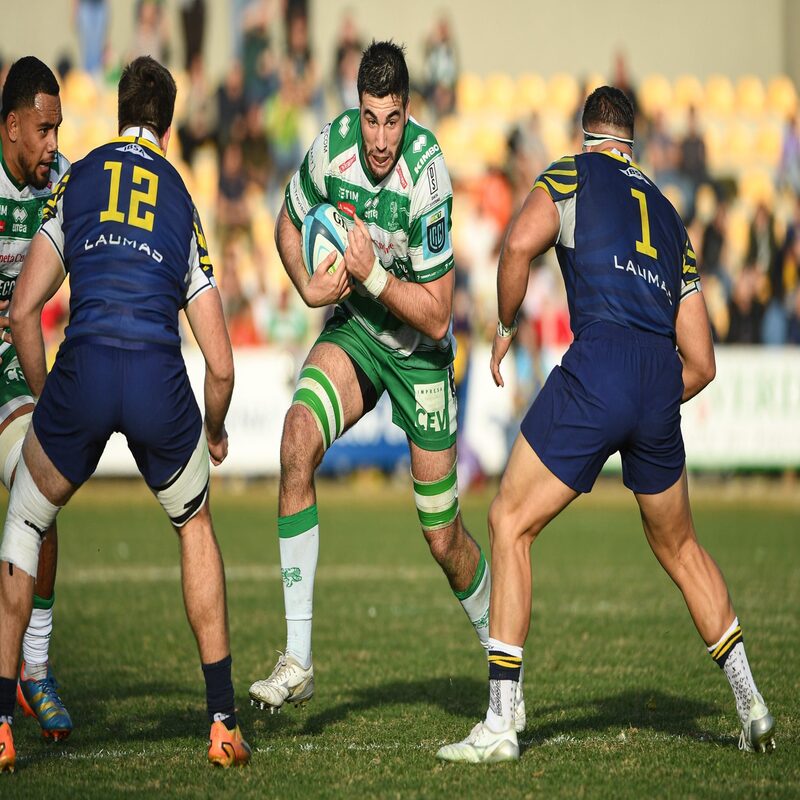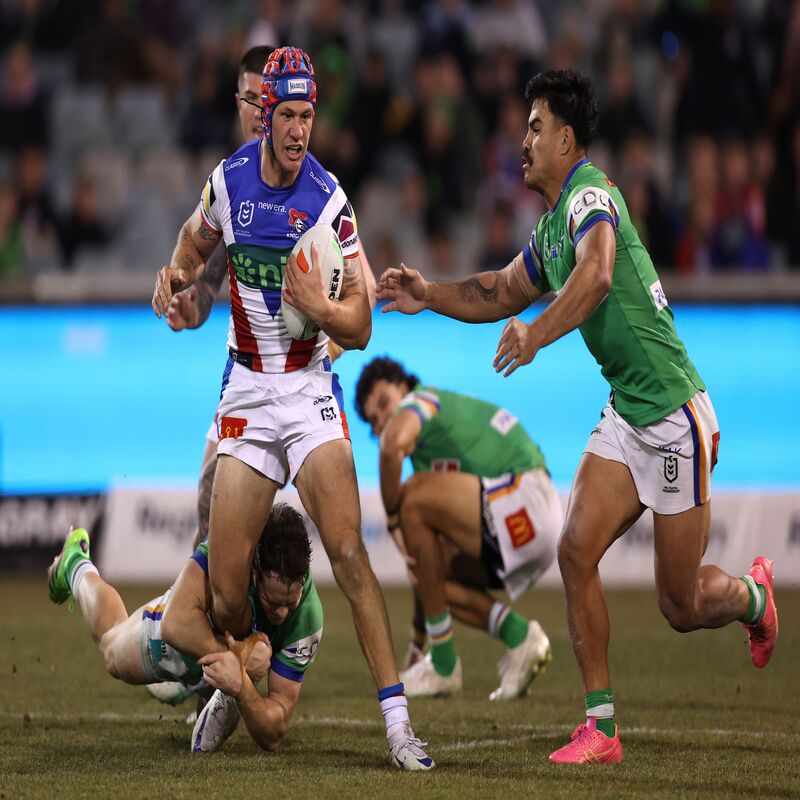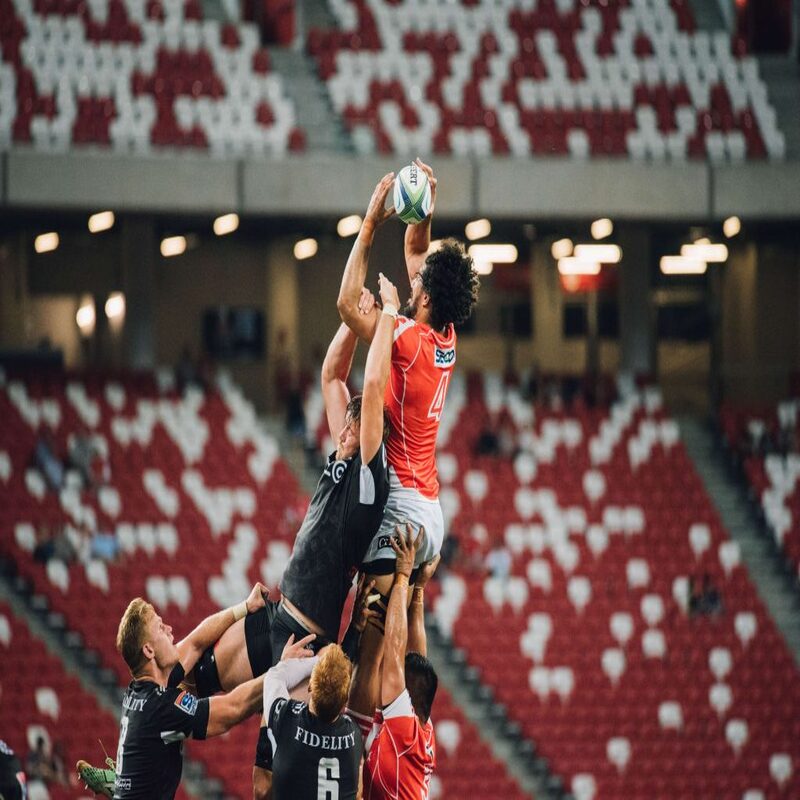The Standard Length of a Rugby Match
Rugby captivates fans with its 80-minute standard match length. Each game is divided into two halves. Each half runs for 40 minutes, totaling a regular game time of 80 minutes. This timing applies to professional and international rugby matches. Yet, the clock doesn’t always match the actual playtime.
The clock can stop, which we’ll discuss shortly, but the rule is two halves of forty. It’s simple. For fans and new viewers, it’s key to remember the halves. These are the basics that shape rugby timekeeping. Understanding this standard helps make sense of the game’s flow.
While we see 80 minutes on the scoreboard, factors like stoppages can extend the game. So, while the basic game structure is set, overall game length can vary. This variation is part of what makes rugby an unpredictable and exciting sport. So, when planning to watch a game, expect around 80 minutes, but be ready for more.

Stoppage Time and Its Impact on Match Duration
In rugby, stoppage time plays a crucial role in the overall match duration. Unlike other sports, referees can halt the game clock. This happens for various reasons, such as injuries, substitutions, or video referee consultations. These pauses are essential for fairness and player safety. They also add to the length of the game.
Several aspects contribute to stoppage time:
- Injuries: Player welfare is paramount in rugby. When a player is down due to injury, the clock stops until they receive proper care.
- Substitutions: Strategic changes can turn the tide in a match. Each time a player swaps out, the game pauses briefly.
- TMO Reviews: The Television Match Official can review key moments. This is to ensure correct decisions on try-scoring and foul play. The game stops while the TMO takes a look.
These events extend the time that spectators spend watching the game. They also add tension and unpredictability to the match’s outcome.
It’s worth noting that not all time lost is made up. For example, time used by players to set up for a penalty kick or conversion isn’t recovered. The clock continues once the game resumes.
Thus, while rugby has an 80-minute standard, stoppage time means the actual match length can be longer. For fans, this means more rugby to enjoy. But for players and coaches, it’s an element they must factor into their strategies. When the clock stops, the intensity remains high as everyone anticipates the next play.

The Role of Set Pieces: Scrums and Lineouts
Set pieces, such as scrums and lineouts, are crucial in rugby. They form key moments that can affect the length of a match. Because these elements are so technical, they often require resets if not performed correctly. This can extend the overall game time.
Scrums and Their Impact on Timing
Scrums happen after minor infringements. They consist of forwards from both teams locking together in a tussle for the ball. A scrum reset occurs if the formation collapses or a fault is spotted. Each reset can add a minute or more to the clock. This time is often unpredictable, adding an extra layer of excitement to the game.
Lineouts and Game Duration
Lineouts are throw-ins that take place after the ball crosses the side touchline. The aim is to regain possession through a jump and catch maneuver. Like scrums, lineouts can also cause time delays. Faulty throws or infractions during a lineout may lead to do-overs. These add not only to the game’s tension but also to its duration.
In summary, set pieces are critical passages of play that contribute to ‘how long does a rugby match last’. They bring unique tactical battles and can lengthen the game, ensuring fans get more action on the pitch.

Penalty Kicks and Conversions Extending Game Time
Penalty kicks and conversions are vital in rugby, with a direct effect on match length. Let’s break down how these factors contribute to extended game time.
The Process of Penalty Kicks
When a team commits a foul, the other team may get a penalty kick. The player taking the kick lines it up, taking time to focus. This period is not part of the active game clock. The minutes spent here tack on extra time that isn’t counted in the standard 80 minutes.
Conversions After Tries
Following a try, the scoring team attempts a conversion. Like penalty kicks, the kicker prepares and aims, adding to the overall duration. These vital points require precision and concentration. The clock stops, but the fans and players feel the anticipation build.
The Unseen Minutes
As spectators focus on the kick, the moments slip by. These essential plays don’t fit neatly into the initial game length. They stretch beyond the planned halves, ensuring accuracy and fair play.
Tactical Implications
Teams may use these moments for a breather or quick discussion. It’s a time for strategizing on the go. Rugby’s nature allows such game dynamics, creating a blend of action and tactic.
In conclusion, the impact of penalty kicks and conversions goes beyond points. It extends the overall length of a rugby match, adding layers to the strategic gameplay fans relish.
The Significance of Extra Time in Knockout Matches
In rugby, knockout matches can feature extra time that heightens the drama. This happens when teams are tied at the end of regular play. The purpose of extra time is to break the deadlock and determine a winner. Here is how extra time influences a rugby match.
- Duration: Extra time generally consists of two separate periods of 10 minutes each. This adds up to 20 minutes of potential play beyond the standard 80 minutes.
- Sudden Death: Sometimes, games feature a sudden death format. Here, the first team to score in extra time wins the game straight away.
- Pace of Play: During extra time, the game often becomes faster. Teams strive to score quickly to avoid the fatigue that comes with prolonged play.
- Strategy Shifts: Coaches may adjust strategies to cope with the extended play. They aim to maximize their team’s chances of scoring while preventing their opponents from doing the same.
- Intensity: The pressure mounts during these added minutes. Players and fans alike feel the urgency, knowing that any point can be decisive.
Extra time brings an additional layer of excitement to rugby. It tests the endurance and skill of the players. It also gives fans more high-stakes rugby to enjoy. The intensity of knockout rugby with extra time is a spectacle that attracts wide admiration. Whether a fan or a newcomer, it’s worth experiencing the thrilling climax of these extended matches.

Half-Time In Rugby: The Breakdown and Beyond
In rugby, half-time serves as a critical intermission for teams. It lasts up to 15 minutes. During this break, teams retreat to strategize and recharge for the second half. This time is crucial for players to rest and coaches to make tactical adjustments.
Vital Team Discussions During Half-Time
Coaches analyze first-half performance. They provide guidance to shift the game’s momentum. Players also grab a chance to recover and refocus.
Preparing for a Second-Half Comeback
Some teams might be trailing on the scoreboard. Half-time gives them a chance to regroup and plan a comeback. Inspirational talks during the break can turn the tide of the match.
The Role of Half-Time in Fan Experience
Fans use the intermission to reflect on the match so far. They grab refreshments and discuss key moments. This pause contributes to the overall event’s social aspect.
In essence, half-time is more than a break. It’s a period loaded with potential game-changing discussions and much-needed rest. It’s when strategies evolve and comebacks are ignited. For fans, it offers a breather and builds anticipation for the half ahead.
Match-Ending Scenarios and the Final Whistle
Understanding when a rugby match officially ends is key for fans and players. The end of a match is not merely dictated by the clock reaching 80 minutes. Rather, specific scenarios dictate when the referee blows the final whistle.
- Ball Going Into Touch: The game doesn’t end exactly at 80 minutes. If the ball is still in play, the match continues until it goes ‘into touch’ or out of bounds.
- Concluding on a Scoring Chance: This rule allows a team with forward momentum to finish their attack. This could lead to a dramatic late score.
- Injury Time not Added: Rugby is unique in how it handles game stoppages. Rather than having injury time added on, the clock stops as these events unfold, ensuring no loss of actual play time.
- Dead Ball Situations: The game can also end when the ball is ‘dead’. This might be after a try or a failed kick that leaves the ball inactive.
- Final Kick Plays: After a try, the game can extend slightly for a conversion kick attempt. The match concludes once the play from this kick is over.
These end-of-game moments can be full of tension. They add to the sport’s unpredictability and excitement. For teams, managing the closing stages is a crucial part of the strategy. For spectators, it’s the high point of the match, where outcomes are often decided in heart-pounding fashion.

Special Conditions: Sudden Death and Place-Kicking Competitions
Rugby matches can enter special conditions. These extend beyond the regular time, adding thrill to the game.
Sudden Death Overtime
‘Sudden death’ means the first team to score wins. It takes place in knockout matches. Should regular play end in a tie, an extra time called ‘sudden death’ kicks in. Players must push their limits to score. Fans stay on the edge of their seats. The match ends once points go up on the board.
Place-Kicking Competitions
If ‘sudden death’ fails to decide a winner, a kicking contest follows. Players from each team take turns to kick at goal. It’s like a penalty shootout in soccer. The team with more successful kicks wins. Tension is high during these competitions. Every kick could seal the team’s fate.
Both sudden death and place-kicking competitions are not common. Yet, they are crucial in deciding outcomes in tied matches. They test skill and nerve, offering fans extra excitement. When they happen, expect unexpected turns and memorable moments.
